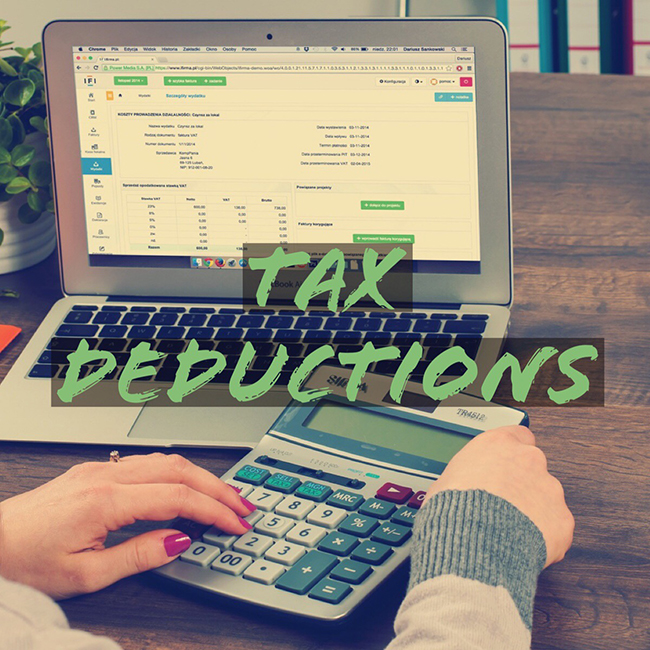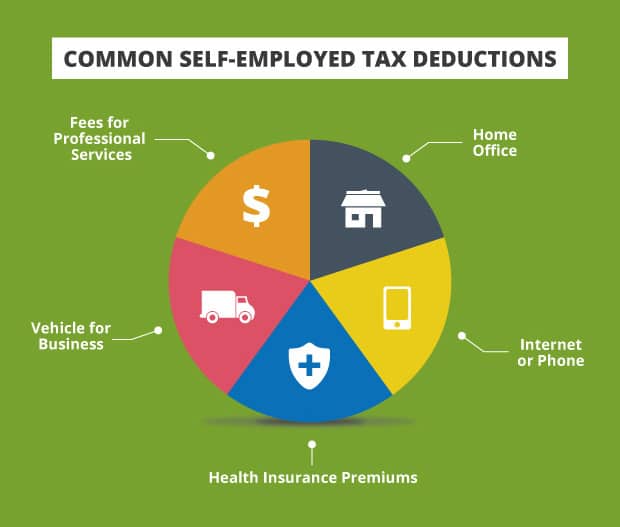If you have recently become self-employed, you'll be happy to know there are many deductions self-employed people can claim. If you are filing your taxes for the first time as a self-employed person, then you are likely to come across the word “tax deduction,” and wonder what it means. A tax deduction is a term that is a term used during tax season and it refers to an amount of money that the IRS allows you to subtract from your income so as to reduce the total taxable amount.
The lower the taxable amount, the less the amount of tax you shall be required to pay. Basically, there are two main deductions in the United States tax laws: itemized deductions and standard deductions. Many people decide to make use of the standard tax deductions option. This is usually a flat amount with the IRS and it allows you to deduct from your tax bill without questions asked. The amount may vary depending on your filing status.
The itemized deduction includes medical tax, home mortgage, taxes paid, and charitable gifts. If the total deductions itemized are greater than your standard deduction, you shall be allowed to use the itemized deductions. This means that you can always use the higher of the two. Our editors have looked into deductions self-employed people can claim and have created a list for you below.

A List Of Self-Employed Deductions When Itemizing
In this review, we look at the types of deductions self-employed people are allowed to deduct from their total taxable income. The first thing you need to understand as a self-employed person is that the government understands that you likely have an office in your home, and therefore most of the deductions are in line with that. Let’s get started
Self-Employment Tax
As a self-employed person, you shall be paying more for social security taxes and Medicare. This is because you do not have an employer who splits this cost with you. Being self-employed also means that you are obligated to pay 15.3% of all your earnings towards the self-employment tax. Luckily, the IRS will allow entrepreneurs and freelancers to deduct the amount that is equivalent to what an employer would contribute to you.
Health Insurance Premiums
Self-employed workers usually need to purchase their own insurance covers for their health. This can be a huge expense, but if you have a net profit for the year, you can claim the amount you paid for health insurance on your income tax. This deduction shall cover your health insurance premiums and also cover any other coverage you may have purchased for your dependents and spouses.
Home Office Expenses
Many self-employed people such as freelancers tend to have home offices, and if you do, then you can claim your home office expenses as a deduction in your tax return. There are usually two main methods of calculating this deduction – the regular and the simple method. With the simple method, you are required to deduct $5 for each square foot in your home you use for your business, and this can be allowable up to 300 square feet.
The regular method requires a deduction of all expenses that are based on a percentage of your home and office expenses. These include mortgage interest, rent, repairs, home or renter’s insurance, and utilities. If you happen to repair the floors in your home, you can only write off a portion of that particular expense if the repair was done in your home office.
Internet Charges And Phone Bills
Being self-employed means that you probably rely on your phone and the internet plenty of time to conduct your business, and that is good news. You can deduct the annual cost of your phone bill and internet cost as part of your expenses. Working from home means that you have a personal internet package and you, therefore, need to calculate the percentage of the time you use it solely for business, and then deduct that amount from your income.
Car Expenses
If you use your car for activities that are related to your business, then you must determine just how much of your car you use for business, and how much you use for personal. If your car utilizes 25% of its usage for business, then you can write-off 25% of the car expenses from your income. This also means that you can expense your car’s mileage for business purposes as well.
Business Travel
One of the most common expenses for self-employed people is that they tend to travel a lot. Now, under allowable deductions, travel costs can be deducted from your total income so as to reduce your net profit. You must, however, meet the following;
- The travel must be related to your business
- You must have traveled far from your area of business for more than a business day.
- The trip must have required a sleep-over or a rest in the middle of the journey.
If your trip meets the above rules, then you can expense the whole 100% travel cost such as flight fare, car rental, hotel stay, tips, and dry cleaning cost.

Deductions Self-Employed People Can Claim Conclusion
Having the option to deduct some of your expenses as a self-employed person can help you pay less taxes to the IRS overall. Being self-employed can be difficult at times since you are both the boss and the worker, so having any financial relief is always great. If that is you then you should utilize deductions self-employed people can make to make the financial side of running your business a little easier so you can concentrate on the bigger picture.




